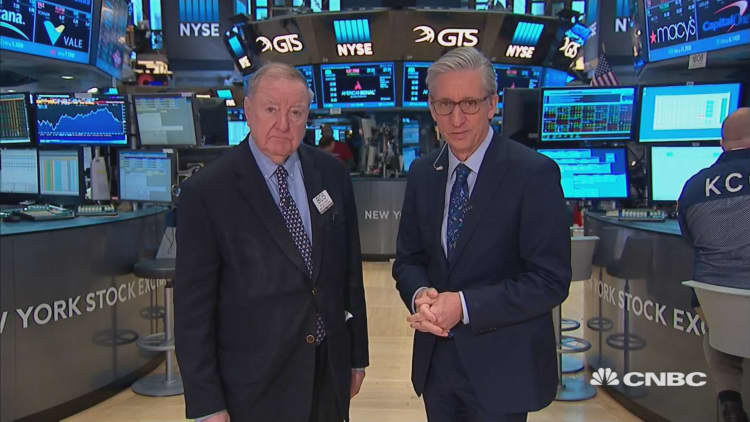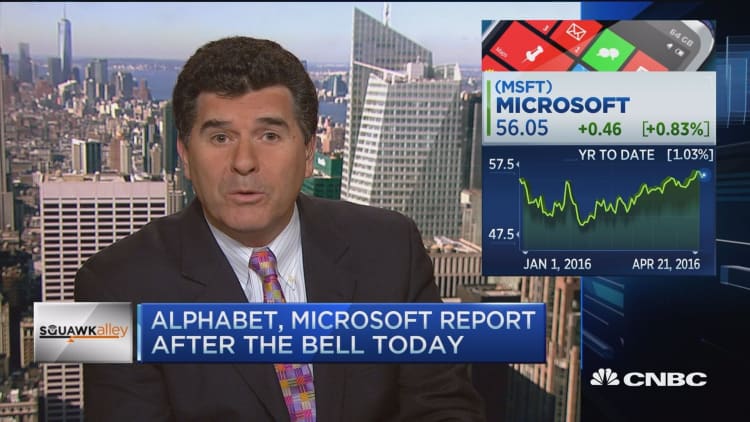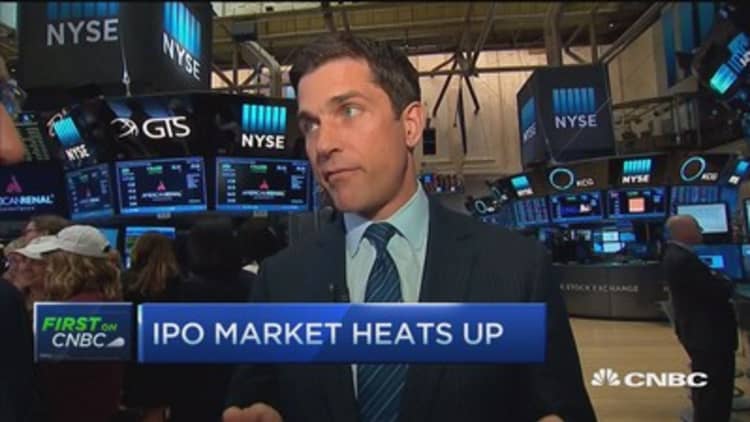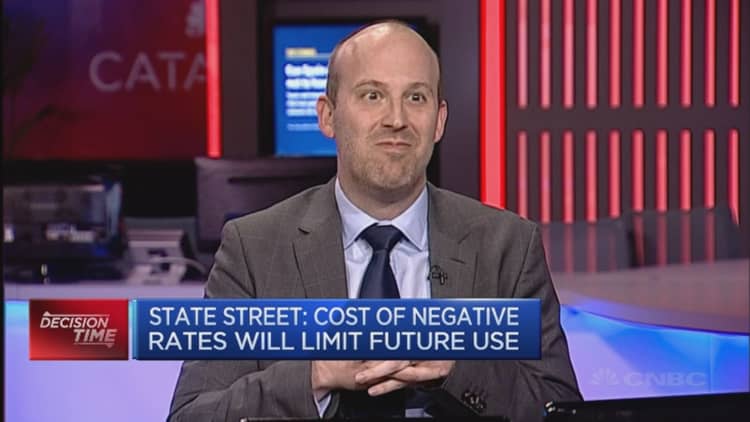



U.S. stocks closed lower Thursday, with telecoms leading declines amid the latest batch of earnings.
"The S&P 500 is definitely weighed on by United, Travelers and Verizon," said JJ Kinahan, chief strategist at TD Ameritrade. "You have a few stocks that have had oversized (impact)."
Telecommunications services closed 2.7 percent lower to lead S&P 500 decliners and only health care gaining. The index closed below the psychologically key 2,100 level, but Kinahan said the more important level for him was 2,082.
The Dow Jones industrial average closed more than 110 points lower to end below the psychologically key 18,000 level as shares of Travelers fell 6 percent as the greatest contributor to declines. The Dow topped 18,000 Monday for the first time since July 2015.
Travelers reported earnings of $2.30 a share, down 10 percent from a year-ago, hurt by hail storms in Texas in March. Storms in Texas are expected to add to losses in the second quarter for Travelers' and other insurers, Reuters said. Total revenue rose 1 percent from the same period last year.
Verizon closed 3.3 percent lower as one of the greatest contributors to declines in the Dow. Verizon said an ongoing strike by its wireline workers was expected to hurt earnings in the current quarter. First-quarter net income met expectations amid strong table sales, Reuters reported.
On Wednesday, the Dow closed at its highest since July 20, 2015, while the S&P 500 closed at its highest since Dec. 1.
"I think we're having a mildly above average earnings (season) but that's probably not going to drive the market much higher," said Mike Bailey, director of research and chair at FBB Capital Partners.
All three major averages are still on pace for their second-straight positive week.
The Nasdaq composite closed just 2 points lower as Apple weighed, falling nearly 1.1 percent into bear market territory, or more than 20 percent below its 52-week intraday high.
Major biotech and tech stocks climbed after morning reports from Biogen and ahead of earnings from Alphabet, Microsoft and Starbucks due after the close.
Biogen earnings topped expectations, helped by aggressive cost cutting, Reuters said.
The Dow transports closed 1.2 percent lower, falling back into correction territory, or more than 10 percent below its 52-week intraday high. United Continental fell nearly 10 percent as the greatest decliner.
United reported earnings of 88 cents a share, a more than 33 percent decline from the same period last year, while revenue fell 4.8 percent. First-quarter consolidated passenger revenue per available seat mile (PRASM) fell 7.4 percent and the company said it could decline as much as 8.5 percent in the current quarter.
In U.S. economic news, the Philly Fed Index was minus 1.6 in April. Weekly jobless claims came in at 247,000, the lowest since 1973.
"I do think from an economic standpoint one of the bright things we'd been seeing was these regional manufacturing numbers pick up pretty reasonably well. Then Philly Fed came out of nowhere," said Ben Pace, CIO at HPM Partners.
U.S. crude oil futures settled down $1, or 2.26 percent, at $43.18 a barrel, pressured by some strength in the dollar and the disappointing Philly Fed read.
Read MoreKensho: Stock winners from improving jobs picture
European stocks were mixed after the European Central Bank kept rates unchanged and ECB President Mario Draghi said he expects rates to remain at present or lower levels for an extended period, according to Dow Jones.
Draghi also said risks to euro area growth remain tilted to the downside, and that inflation rates could turn negative again in the coming months before picking up in the second half of the year, Dow Jones reported. He added it is essential to preserve appropriate accommodation as long as needed.
The STOXX Europe 600 Bank index closed nearly 1.4 percent higher.
The euro near session lows around $1.127 after earlier rising to trade around $1.139. The U.S dollar index reversed to hold mildly higher, with the yen near 109.45 yen against the greenback. Gold spiked to its highest since March 1 before settling down $4.10 at $1,250.30 an ounce.
"The euro rallied at first but I think the move was somewhat unwarranted because Draghi didn't say anything that was deemed as hawkish," said Thierry Albert Wizman, global interest rates and currencies strategist at Macquarie. He said recent strength in the U.S. dollar and the rise in Treasury yields was related to expectations of higher inflation and the Fed moving sooner rather than later.
Read MoreWatch out US—Draghi's QE is coming your way
The euro/dollar and other currencies remained in a tight range for the session.
"The market is thinking the ECB policy is not as effective as Mario Draghi wants to have it and questioning whether or not they will continue on this path given the implications for the European economy and the political landscape." Omar Aguilar, CIO of equities, Charles Schwab Investment Management.
In other U.S. economic news, the FHFA Housing Price Index showed a 0.4 percent rise in February, after a downwardly revised 0.4 percent rise in January.
Leading indicators in March rose 0.2 percent.
Treasury yields held higher, with the near 0.80 percent and the 10-year yield around 1.87 percent. Earlier, both yields hit their highest since late March.
Major U.S. Indexes
Asian stocks closed mostly higher, with the Nikkei 225 up 2.7 percent. The Shanghai composite closed about two-thirds of a percent lower.
Read MoreEarly movers: TRV, GM, LUV, UA, DHI, AXP, SWK, YUM, MAT, QCOM & more
The Dow Jones industrial average closed down 113.75 points, or 0.63 percent, at 17,982.52, with Travelers leading decliners and IBM the top advancer.
The closed down 10.92 points, or 0.52 percent, at 2,091.48, with telecommunications leading nine sectors lower and health care the only advancer.
The Nasdaq composite closed down 2.24 points, or 0.05 percent, at 4,945.89.
The CBOE Volatility Index (VIX), widely considered the best gauge of fear in the market, rose to trade near 13.7.
About two stocks declined for every advancer on the New York Stock Exchange, with an exchange volume of 997 million and a composite volume of nearly 4.1 billion in the close.
—Reuters contributed to this report.
On tap this week:
Friday
Earnings: General Electric, Caterpillar, McDonald's, Honeywell, AutoNation, American Airlines, Synchrony Financial, Kimberly-Clark, SunTrust, LyondellBasell, Steve Madden, Daimler
9:45 a.m. Manufacturing PMI
*Planner subject to change.
More From CNBC.com:





